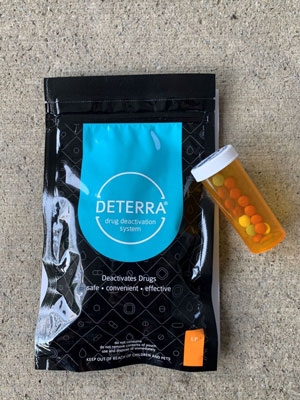Opioids
Opioids are a class of drugs that impact the central nervous system and alter sensations, such as the ability to feel pain. Examples include the illegal drug heroin, as well as several prescription pain relievers.
The use of opioids without a medical prescription is illegal and carries significant health risks. These risks can be explored through the National Institute on Drug Abuse.
If prescribed an opioid, check out our page on Tips for Safeguarding Medications.
Overdose Prevention
Naloxone, sometimes referred to by brand name Narcan, is a medication that can be used to briefly reverse the effects of an opioid overdose by working as an opioid antagonist. A person who has experienced an overdose must still be seen for immediate medical attention after naloxone is administered. Call 911 to get immediate medical attention. Signs of an overdose may include:
- Unconsciousness
- Very small pupils
- Slow or shallow breathing
- Vomiting
- Inability to speak
- Faint heartbeat
- Cool, clammy skin
- Discoloration of the lips or fingernails
Naloxone can be administered as an injection or nasal spray. Narcan is one common brand of naloxone nasal spray, and it is available on campus, at local pharmacies, or at community agencies.
Visit go/Narcan to see the map of stations and learn more about harm reduction supplies available on campus. Middlebury stocks harm reduction stations that contain Narcan, among other supplies, in areas where students, staff, and/or faculty have been trained to use Naloxone.
Medication Disposal

Returning unused prescription or over-the-counter medication is a powerful way to take care of your community and create substance-free spaces. When medications that are no longer needed sit around, they are more easily accessed by people who may be experiencing addiction, considering suicide, or consumed accidentally by children or pets. Learn more about medication disposal and stop by the Health and Wellness Education Office, Health Services, or any RA Office to pick up a free medication-disposal kit.
Know that prescription and over-the-counter medication can also create problems in the environment. When medications are flushed down the toilet or dumped down the sink, they can have lasting effects on habitats around us and our water supply. Flushing medications, though seemingly innocuous, can have significant negative impacts on our water quality, health of waterways and aquatic species, and contribute to the development of antibiotic resistant bacteria, which all ultimately effect human health.
We are all interconnected. Properly disposing of medications is a great way to protect ourselves, our family, our friends, and our ecosystems. You can play a part in prevention by taking the time to properly dispose of medication you no longer need. Stop by the Health and Wellness Education Office, Health Services, or any RA Office to pick up a free medication-disposal kit.
Programs
Students can sign up for online offerings and may also be sanctioned to attend by a conduct officer. To request a program for yourself, your hall, organization, or team, please contact Anna Hand or set up a meeting.
- My Story (A Brief AOD Intervention)
My Story is a brief intervention that consists of several confidential individual 60-minute sessions over the course of a few weeks with a Health Educator from Health and Wellness Education to explore one’s personal relationship with substance use, get individualized feedback, and learn about support services. This program follows an evidence-based curriculum that gives participants structured time for verbal and written reflection, and is appropriate for discussion about all substances including the use of alcohol, cannabis, nicotine, psychedelics, opioids, and more. At the completion of the first session, the participant and Health Educator will arrange follow-up meetings spaced out over the next month. Sign up.
- Other Drugs Online Course
The Other Drugs online course takes about 30 minutes to complete. It provides the physiological, health, and legal consequences of drug use and possession. This course covers stimulants, inhalants, ecstasy or hallucinogens, street opioids, herbal/synthetic drugs, sedatives and prescription painkillers. To gain access to this course, please email healthandwellnessed@middlebury.edu.
Harm Reduction
Before engaging in substance use of any kind, consider the following:
- Medical conditions that carry elevated risk
- Medications that may cause dangerous interactions
- The safety of the environment (e.g. calm, familiar setting)
- Communication with trusted friends and/or family members
- Emergency plans in the event of an incident
Click below for more information on harm reduction and support.
Resources and Support
Note: this list is not a full list of resources available.
- Make an appointment. Talk to a health educator on campus by visiting our Make an Appointment page or by emailing Health and Wellness Education.
- Visit community resources. The Turning Point Center of Addison County is conveniently located within Middlebury. VT Helplink is a state-level alcohol and drug support center.
- Contact a national resource center. The Substance Abuse and Mental Health Services Administration (SAMHSA) offers a National Helpline (1-800-662-4357).
In Case of Emergency
Call 911 for any medical, fire, police, or life-threatening emergency.
For other emergencies call Public Safety at 801-443-5911.

